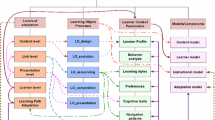Abstract
E-learning systems, also called virtual learning environments, promote education and training activities using modern information and communication technologies. Therefore, e-learning is the application of modern multimedia technologies and the Internet to improve the quality of learning by making resources and services more accessible, as well as exchanges and collaboration at a distance that can help learners in their studies and that can also help teachers to predict the weaknesses, strengths, and level of understanding of learners. Preparing and providing a quality e-learning system and rich learning experience are significant challenges. The lack of interaction, feedback, helping the learner to self-regulate, assessing the degree of knowledge, and adapting teaching methods and resources to the learners’ real needs, which imply a lack of motivation and a high dropout rate, diminish the richness of the learning experience. Hence, we propose in this article a robust model of adaptive e-learning environments to optimize learning for each learner, taking into account the heterogeneity of profiles so that students succeed in their learning experiences.
Access this chapter
Tax calculation will be finalised at checkout
Purchases are for personal use only
Similar content being viewed by others
References
Baudoinm, N., et al.: Le bien-être et la motivation des élèves en période de (dé) confinement Note de synthèse, pp. 1–12 (2020). https://doi.org/10.1111/bjep.12342
Bowman-Perrott, L., Davis, H., Vannest, K., Williams, L., Parker, R., Greenwood, C.: Academic benefits of peer tutoring: a meta-analytic review of single-case research. Sch. Psychol. Rev. 42(1), 39–55 (2013). https://doi.org/10.1080/02796015.2013.12087490
Lee, Y., Choi, J.: A review of online course dropout research: implications for practice and future research, pp. 593–618 (2011). https://doi.org/10.1007/s11423-010-9177-y
Eom, S.B., Ashill, N.J.: A system’s view of e-learning success model, 16(1), 42–76 (2018)
Jahanbakhsh, R.: Learning styles and academic achievement: a case study of Iranian high school girls students. Procedia - Soc. Behav. Sci. 51(1988), 1030–1034 (2012). https://doi.org/10.1016/j.sbspro.2012.08.282
Kyndt, E., Dochy, F., Struyven, K., Cascallar, E.: The direct and indirect effect of motivation for learning on students’ approaches to learning through the perceptions of workload and task complexity. High. Educ. Res. Dev. 30(2), 135–150 (2011). https://doi.org/10.1080/07294360.2010.501329
Sorgenfrei, C., Smolnik, S.: The effectiveness of e-learning systems: a review of the empirical literature on learner control, 14(2) (2016)
Martin, A.J.: Motivation and engagement: conceptual, operational and empirical clarity, pp. 0–15 (2012)
Kim, C., Park, S.W., Cozart, J., Lee, H.: From motivation to engagement: the role of effort regulation of virtual high school students in mathematics courses, 18, 261–272 (2015)
Zimmerman, B.J., Schunk, D.H.: Self-regulated learning and performance: an introduction and an overview (2011)
Zimmerman, B.J.: Motivational sources and outcomes of self-regulated learning and performance, 11237 (2011). https://doi.org/10.4324/9780203839010.ch4
Zimmerman, B.J.: Investigating self-regulation and motivation: historical background, methodological developments, and future prospects, 45(1), 166–183 (2008). https://doi.org/10.3102/0002831207312909
Schunk, D.H., Meece, J.R., Pintrich, P.R.: Motivation in Education: Theory, Research, and Applications, 4th edn. (2014)
Perry Nancy, E., Ahmed, R.: Studying self-regulated learning in classrooms (2011)
Barnard-Brak, L., Paton, V., Lan, W.: Self-regulation across time of first-generation online learners. Res. Learn. Technol. 18(1), 61–70 (2010). https://doi.org/10.3402/rlt.v18i1.10752
Ferla, J., Valcke, M., Schuyten, G.: Judgments of self-perceived academic competence and their differential impact on students’ achievement motivation, learning approach, and academic performance. Eur. J. Psychol. Educ. 25(4), 519–536 (2010). https://doi.org/10.1007/s10212-010-0030-9
Dabbagh, N., Kitsantas, A.: Supporting self-regulation in student-centered web-based learning environments. Int. J. E-Learning 3(1), 40–47 (2004)
Wandler, J.B., Imbriale, W.J.: Promoting undergraduate student self-regulation in online learning environments (2017). https://doi.org/10.24059/olj.v21i2.881
Safsouf, Y., Mansouri, K., Poirier, F.: An analysis to understand the online learners’ success in public higher education in Morocco (2020). https://doi.org/10.28945/4518
Diaz, A.L.: Personal, family, and academic factors affecting low achievement in secondary school. undefined (2003)
Kauffman, H.: A review of predictive factors of student success in and satisfaction with online learning. Res. Learn. Technol. 23(1063519), 1–13 (2015). https://doi.org/10.3402/rlt.v23.26507
Piccoli, G., Ahmad, R., Ives, B.: Web-based virtual learning and a research framework environments: a preliminary assessment of effectiveness in basic it skills training1, 25(4), 401–426 (2001)
Durall, E., Gros, B.: Learning analytics as a metacognitive tool (2014). https://doi.org/10.5220/0004933203800384
Hammad, R., Odeh, M., Khan, Z.: eLEM: a novel e-learner experience model, 14(4), 586–597 (2017)
Romero, C., López, M., Luna, J., Ventura, S.: Predicting students’ final performance from participation in on-line discussion forums. Comput. Educ. 68, 458–472 (2013). https://doi.org/10.1016/j.compedu.2013.06.009
Yukselturk, E.: An investigation of factors affecting student participation level in an online discussion forum. Turkish Online J. Educ. Technol. 9(2), 24–32 (2010)
Prud, L., Leblanc, M., Paré, M., Fillion, P.: Différencier d’abord auprès de tous les élèves: un exemple en lecture (2015)
Przesmycki, H.: La pédagogie différenciée, pp. 2–3 (2004)
García Carreño, I.D.: Hacía una evaluación integral con ePortafolio por evidencia y bPortafolio (2012). https://www.researchgate.net/publication/282133572_Hacia_una_evaluacion_integral_con_ePortafolio_por_evidencia_y_bPortafolio. Accessed 06 June 2021
Leyva, L., Garrido, Y., Leyva, J.L.L., Varona, R.C., Rodríguez, R.H.R.: Reflexiones sobre la evaluación de la calidad del aprendizaje en la práctica pedagógica en la escuela primaria. undefined (2007)
Zimmerman, B.J.: Attaining self-regulation: a social cognitive perspective, pp. 13–39 (2000)
Watson, G.: The legacy of Ishikawa. undefined (2004)
Zimmerman, B.J., Campillo, M.: Motivating self-regulated problem solvers, pp. 233–262 (2003)
Santos, J.L., Govaerts, S., Verbert, K., Duval, E.: Goal-oriented visualizations of activity tracking: a case study with engineering students, pp. 143–152 (2012)
Author information
Authors and Affiliations
Editor information
Editors and Affiliations
Rights and permissions
Copyright information
© 2022 The Author(s), under exclusive license to Springer Nature Switzerland AG
About this paper
Cite this paper
Kaiss, W., Mansouri, K., Poirier, F. (2022). Towards a Model of Self-regulated e-learning and Personalization of Resources. In: Maleh, Y., Alazab, M., Gherabi, N., Tawalbeh, L., Abd El-Latif, A.A. (eds) Advances in Information, Communication and Cybersecurity. ICI2C 2021. Lecture Notes in Networks and Systems, vol 357. Springer, Cham. https://doi.org/10.1007/978-3-030-91738-8_26
Download citation
DOI: https://doi.org/10.1007/978-3-030-91738-8_26
Published:
Publisher Name: Springer, Cham
Print ISBN: 978-3-030-91737-1
Online ISBN: 978-3-030-91738-8
eBook Packages: Intelligent Technologies and RoboticsIntelligent Technologies and Robotics (R0)




